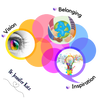|
In January, I wrote, "In the coming weeks, I will be blogging about some of the important issues of this work - the intersection of CAST and CASEL's work with the Three-Block Model, funding models and their impact on children, families, and teachers, and more."
Hmm, seems to have taken more than a few weeks! Often people ask me about the relationship between CAST's work, the "multiple means" principles, and the TBM. It's not a simple answer - this is complex work. What I do know is - diversity os a good thing, and we always have much to learn from each other. I won't presume to tell people from CAST what they might/could learn from the TBM, but I will tell you what I have learned from them. A Lot! The whole idea of designing learning environments "to the edges" - to be accessible to the most people possible, underlies both models. The basic principle that all of our students deserve access to the social and academic life of the classroom inspires all of us to find better ways, to invest, to create and discover. We have slightly different methods of getting there, but our destination, motivation, and determination are shared. All of the people I have met at the UDL-IRN have taught me a great deal, and I am grateful that they are so open to sharing and connection - practicing what we preach is important. Integrity. I have not met anyone with more integrity than David Rose. In the short contacts I have had with him, a man who could easily choose to play the arrogant guru, he has been exactly the opposite. Open, supportive, inspiring. I have sought advice and ideas regarding large-scale implementation, and CAST has provided it. As a PhD student, I was also influenced by the work of CASEL - the Collaborative for Academic and Social-Emotional Learning (SEL). I have always valued the relationships I have with my students, and they have with each other, and themselves. CASEL's work taught me how much of an influence those elements have in learning. Their neurological emphasis on the connection between SEL and academic learning is powerful, and has played a huge role in the development of "Block One" in the TBM. It will take a village to raise our children - and our profession. Celebrate the diversity of people's gifts.
2 Comments
6/3/2021 01:48:37 pm
I found this on internet and it is really very nice.
Reply
Leave a Reply. |
AuthorI am an assistant professor at the University of British Columbia in Inclusive Education, and the developer of the Three Block Model of Universal Design for Learning. Archives
November 2023
Categories
All
Twitter
|
- Home
-
The Three Block Model of UDL
- Services
- Resources
-
Video Series: Inclusive Classrooms
- Series 1 - Equity, Diversity, Justice & Inclusion
- Series 2 - UDL & The Three Block Model
- Series 3 - SEL, Neuroscience, Belonging & Self-Regulation
- Series 4 - Mental Health, Trauma, & Dealing with Challenging Behavior
- Series 5 - Inclusive Instructional Practice
- Series 6 - Starting the Year
- Series 7 - Universally Designed Literacy instruction
- Series 8 - Universally Designed Numeracy Instruction and Assessment
- Series 9 - UDL & INDIGENOUS EDUCATION
- Series 10 - Inclusion in High School
- Video Series: Supporting Struggling Learners
- Video Series: Leadership For Inclusion
- Events
- Publications & Links
- Organization
- Store
- Blog
- Contact Us
- EPSE 317
- For Certified Facilitators Only

 RSS Feed
RSS Feed